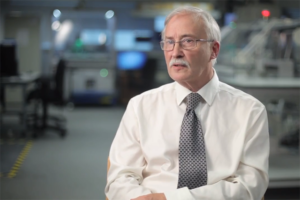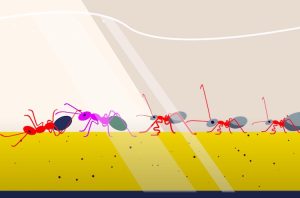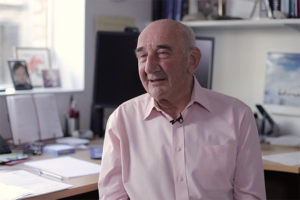The Microbiome and Metabolism
Biochemist Ian Wilson on the size of human microbiome, living in a symbiotic relationship with our microflora,...
Over the many decades of psychologists and neuroscientists studying memory, many people have been interested in studying short-term memory. Part of the reason for distinguishing short-term memory or working memory from long-term memory came from the 1950s when people began to understand the nature of how memory depended on the brain.
Also, his short-term memory seemed to be fine, so in the classic neuropsychological tests that you would give to a patient like remembering a sequence of numbers in order, like a new telephone number, his performance was fine, so he could remember lists of numbers or words in order in immediate memory. If you test him immediately afterwards then he’s fine. So it seems that this sort of short-term memory is different to the general memory or long-term memory where he can’t remember what happened to him in the days and weeks and indeed months and years previous.
He could also remember, for example, to tap sequence of locations on some blocks in order if tested immediately, so a short-term memory for sequences of locations, or sequences of words, or sounds, or numbers tested immediately seemed to be fine. A distinction was clearly present between long-term memory for what’s happened to you which does depend on the hippocampus, and short-term memory over small number of seconds if I ask you something and test you immediately afterwards, seems to not depend on hippocampus and be preserved in the classic amnesic patients that have hippocampal damage.
What we’ve learned from this is that there are probably neocortical, perhaps basal ganglia mechanisms, parts of the brain outside of hippocampus which can support for a very short-time certain kinds of information, like a sequence of numbers, or a sequence of locations, or a sequence of actions to tap.
More recently it’s become clear that there are also some kinds of information which even for a short period of time you can’t remember if you don’t have a hippocampus. The distinction between short-term memory and long-term memory was originally made like, you know, here’s a box that involves the hippocampal system in which we put our long-term memories for long-term storage, and then here’s another box which is somewhere else in the brain, perhaps in parietal and prefrontal areas, where we can store things for a short period of time. That story is becoming a little bit more mixed now. All the way from the earliest experiments it was clear that there’s an element of active rehearsal, if you like, in remembering a sequence of numbers or a sequence of actions. If we give an intervening task often referred to as Brown–Peterson task after psychologists who first tried putting an intervening task before asking for recall, then that short-term memory can be disrupted and performance can be very poor, particularly in amnesic patient who is not allowed to actively rehearse or to keep this information online in some way if there’s an intervening task and then they have to think back to what happened, then their memory is very bad.
A lot of current research is focused on understanding exactly what the differences are, what things you can maintain in active memory or working memory for some seconds even if you don’t have a hippocampal, a long-term memory system to rely on and what kinds of things you use this this long-term memory system for even over short durations so that if you don’t have that system or it is damaged in some way then you see an impairment in short-term responding.
As I said, the classic distinction between short-term memory and long-term memory really was a distinction between things that you can keep online.
If I present this information and you can continue to think about it and then you’re tested on what had happened then that would be working memory, or active memory, or short-term memory whereas if I gave you a distractor task so that you were not allowed to continue thinking about whatever the stimuli were, then to remember what had happened you would now need long-term memory because you weren’t able to keep those thoughts currently active.
This idea of active memory versus long-term memory is also a little bit coming under question in terms of what the brain mechanisms are, because for a long time it was thought that active memory was actually the information you could represent by the continued activity of the neurons that encode that kind of information, whereas in long-term memory the neurons are active during encoding, perhaps strengthen electrical connections between these neurons and then that is the long-term memory which you can come back to days or weeks later by reactivating part of it and having those strengthened connections reactivate the rest of the memory. It’s not so clear if that simple understanding of active versus long-term memory is the case in all situations. For example, now people are doing sophisticated functional imaging experiments while people do remember things for short periods of time, and it’s not clear if those items are being actively maintained or whether perhaps there’s something like short-term plasticity in the connections between neurons which is able to store information for short periods of time and not necessarily in an active state in terms of neurons actively representing that information during this delay period before you’re tested.
So I think going forward in the field of memory people are beginning to concentrate a little bit more on the nature of the neural representation of information and the mechanisms by which that can be maintained. For some examples, like the remembering a sequence of words or digits in order that I mentioned before, there clearly are active mechanisms, a little bit like saying the sounds to yourself and hearing them and therefore keeping alive that sequence of activity. The psychologists Alan Baddeley and Graham Hitch worked on a nice model of what they called the phonological loop to explain how this information can be kept going for short periods of time and how it’s disrupted by an intervening task.

When you start to think about a short term memory or long-term memory, actually if you think about the mechanisms required, it may turn out that for some stimuli (as I said, spatial) it seems there’s not a mechanism depending on neocortical areas that can keep this information active. To actually represent it, you do need parts of the brain that are typically associated with long-term memory like hippocampus to represent it in the first place. Maybe there’s not a mechanism for keeping that representation active in the way that there might be for saying some sequence of sounds to yourself and hearing them and thereby almost like some subvocally rehearsing that information, it may not exist for other kinds of stimuli.
So what we get is a picture where different kinds of things are actually remembered in slightly different ways. There seems to be some commonality in that if you have to remember something for a long time and so if you’re going to be asked a long time later which is no hope that you could keep this information active for that time, then you probably will depend on the hippocampal memory system, and amnesic people won’t be able to remember that information if it’s stuff that you have to actually remember the experience of seeing before, whereas the actual mechanisms used for short periods of time or long periods of times may differ. They may depend on different parts of the brain that may depend on the nature of the information that you’re trying to remember.
So going forward I think this focus on mechanism beyond say a simple storage box for short-term memory or storage box for long-term memory that’s what we’re beginning to see. We would expect to see this understanding giving us advances in understanding different kinds of neurological patients who have different kinds of difficulty remembering different kinds of things.

Biochemist Ian Wilson on the size of human microbiome, living in a symbiotic relationship with our microflora,...

New study describes genealogy and spreading of one of the most damaging species of pest ants

Respiratory scientist Peter Barnes on the Chronic obstructive pulmonary disease, responsiveness to steroids, a...